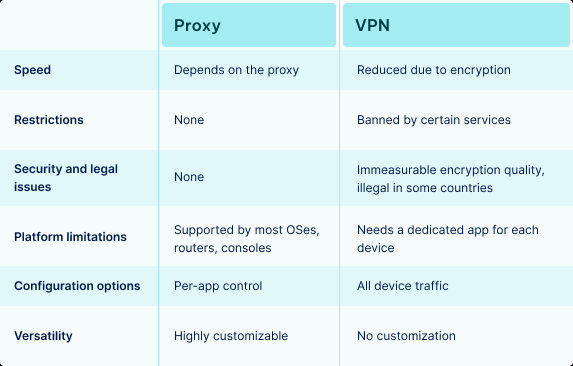Proxy vs. VPN: Understanding the Key Differences
Proxy fundamentals

Justas Palekas
Whenever someone wants to increase the privacy and security of their internet connection, they either turn to proxies or VPNs. Since both of these tools can protect your identity online, many businesses, institutions, and individuals use them interchangeably. However, they work in different ways.
Only by understanding their differences can you determine the right tool for your browsing needs. To help you solve the proxy vs. VPN confusion and make a well-informed decision, we’ll explain how they work and explore their similarities and differences.
Understanding Proxies
A proxy server is an intermediary between a client and a server, with a unique IP address in a location of your choice. When a user requests a resource, such as a web page, the request is first sent to the proxy server, which then forwards it to the destination server. In the same manner, it retrieves the resource on behalf of the client.
As a result, your IP address stays hidden, and your online identity and privacy stay protected. This can be useful for a variety of reasons, such as improving anonymity, bypassing geographically restricted content, or accessing websites that are blocked by a network administrator. For further use cases, read our blog on what are proxies used for .
Understanding VPNs
Similar to proxies, a VPN or a Virtual Private Network routes your traffic through a private server before sending it to its intended online destination. This way, it makes your internet traffic appear as if it’s coming from another IP address. However, VPNs encrypt your traffic in the process, which ensures a high level of security.
Installing a VPN on your device ensures all your traffic goes through it. Although a proxy can do the same thing, it also allows you to set it up just for a single app or browser and use your own IP address for everything else. So while VPNs offer a one-size-fits-all solution, proxies have a much more diverse functionality.
Even though some types of proxies support encryption as well, when considering proxies vs VPNs , it’s important to note that VPNs are designed with encryption in mind. While this is good for your online security, especially when using public Wi-Fi networks, it comes with a few downsides you should be aware of.
Proxy vs. VPN – Similarities and Differences
With 8 out of 10 people being concerned about their online privacy, it’s no wonder these tools are so popular. While it may seem both can get the job done, they do it differently. And depending on your needs, you might want to use one over the other.
When it comes to their similarities, it’s obvious – they both hide your real IP address and provide you with increased online anonymity and privacy. Now let’s see how they differ in terms of:
- Ease of use
VPNs tend to be easier to set up and use because they are designed for individuals, as opposed to proxies which cater more to businesses and professionals. Hence, proxies, especially residential proxies , are better for business usage scenarios such as web scraping, ad verification, and SEO research. On the other hand, VPNs might be more suitable for average internet users without technical experience.
- Security and speed
Encrypting your traffic makes your connection more secure, at the cost of your internet speed. Since VPNs are always encrypted, they ensure network security while slowing your connection down . With proxies, you don’t have to worry about slowdowns. This makes them more suitable for streaming, video conferencing, gaming, or any other activity that requires high bandwidth and low latency.
- Configuration options and versatility
Installing a VPN on your device ensures all your traffic goes through it. Although a proxy can do the same thing, it also allows you to set it up just for a single app or browser and use your own IP address for everything else. So while VPNs offer a one-size-fits-all solution, proxies have a much more diverse functionality.
- Restrictions
Both tools can make it appear as if you’re somewhere else, so you can access region-restricted content from anywhere. However, certain websites, games, and streaming platforms like Hulu and Netflix don’t allow the usage of VPNs. In such cases, proxies can be the perfect solution, as their IPs come from real users and real ISPs .

Final Thoughts
There’s no clear winner in the proxy vs. VPN debate. Both will protect your IP address and offer improved online privacy - the right option depends on your needs. Whether you choose proxies or VPNs, make sure to do your research and use a reliable provider with a great track record.

